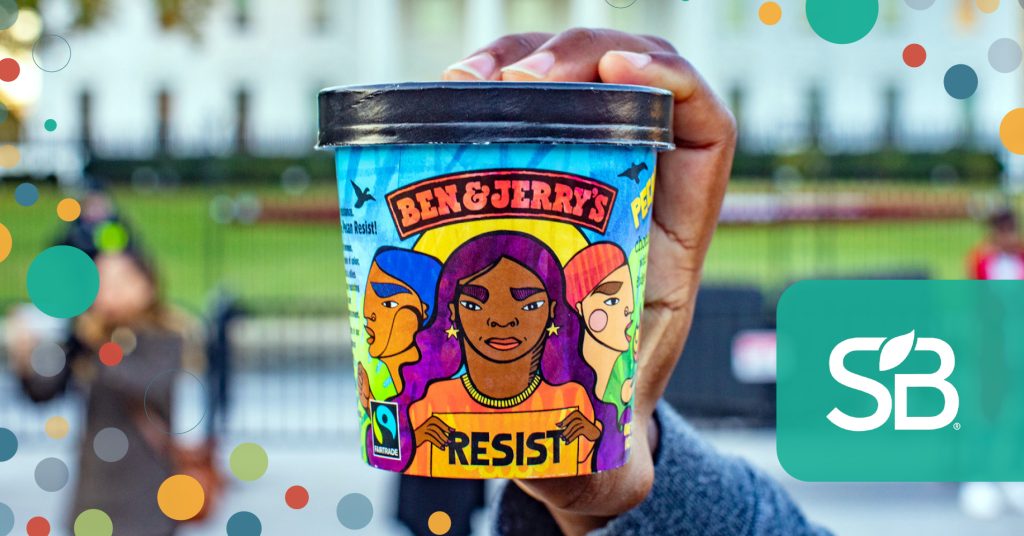2 Truths and a Lie About Corporate Sustainability
3 min read
Truth 1: US consumers’ appetite to hear from businesses on current events has
dropped 10% in the last two years (Gallup,
2024).
Truth 2: Sustainably marketed products grow 2x faster than conventionally
marketed products (NYU Stern,
2024).
Lie: Sustainability communications have seen their heyday.
Consumer paradox
Over the last 18 months, there has been a dizzying volley of research that
predicts the collapse of sustainable business practices one day and the growth
of them the next. As purpose practitioners, we must resist the temptation to
cherry-pick data that solely supports our position and confront this complex
reality head on.
Corporate political responsibility: Lessons learned in 2024 and support for 2025 and beyond
Since 2021, the SB community has explored what it means for companies to use their political influence responsibly in an increasingly polarized world. What have we learned? Join us for an interactive “community café” to dive into this — as well as the Erb Institute’s new CPR Decision Tool & Executive Conversation Guide and related case studies — Monday, Oct. 14, at SB’24 San Diego.
The reality is that consumers are increasingly fatigued by businesses taking
positions on social and political
issues,
as the new Gallup data show (although it’s worth noting that there’s greater
appetite for businesses to comment on issues that are classified as issues of
low divisiveness, according to a recent HBR
article.
Sometimes they just want to make a purchase without considering a myriad of
ethical implications.
However, this does not mean that sustainability has lost its importance with
consumers.
There’s
endless
research
to prove consumers want to shop sustainably and hear from companies about what
they’re doing to minimize their impact. We also know that they’re putting their
money where their mouth is — with consumers spending $44 billion on
sustainable brands in
2023.
Further to this, a belief that a company is supporting causes I (the consumer)
care about is a massive driver of brand reputation
health.
Reconciling contradictions
So, how do we reconcile the reality that consumers’ appetite to hear from
companies on social and political issues is declining while demand for
sustainable products is growing?
The key lies in recognizing that corporate activism (corporate commentary on
socio-political issues such as vaccine mandates, geopolitical war etc) and
corporate sustainability are distinct concepts. While consumers may be wary of
businesses commenting on every socio-political issue, they still value and seek
out sustainable products and practices.
The path forward — alignment is key
The diminishing interest in corporate
activism
isn’t a call for businesses to remain silent and focus solely on profits.
Rather, it’s a demand for authenticity and relevance in corporate messaging.
A relationship between a company and its customers is built on integrity,
reliability and trust. These pillars are reinforced through consistency. Your
customers should never feel blindsided by your company’s messages or
commitments.
For sustainability-linked messaging to resonate, it must:
-
Align tightly with your core
business
(what you do and who you serve) -
Address causes your audience genuinely cares about.
This is where corporate activism has failed — when the message is inconsistent
with customers’ relationship with the brand/business, it can leave both external
and internal audiences feeling disconnected.
Capitalizing on purpose hinges on your company’s ability to identify a select
few social and/or environmental issues that meet the above criteria. REI has
done it with “Opt Outside,” IKEA with its planet-focused
commitments,
Nike and accessible youth
sport (to
name just a few). These companies have masterfully aligned their sustainability
efforts with their brand identity and customer values.
The bottom line
Effectively leading with purpose isn’t about speaking out on every issue — it’s
about strategically aligning your sustainability efforts with your core business
and your customers’ values. By doing so, you create a powerful synergy that
drives both social impact and business success.
Remember: In the world of corporate sustainability, relevance and authenticity
are your most powerful tools. Use them wisely, and you’ll not only contribute to
a better world but also forge stronger connections with your customers and
stakeholders.







